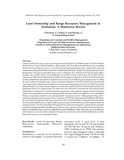Please use this identifier to cite or link to this item:
https://cris.library.msu.ac.zw//handle/11408/477| Title: | Land ownership and range resources management in Zimbabwe: a histrorical review | Authors: | Chivandi, E. Fushai, F. Masaka, Johnson |
Keywords: | Land Ownership Sustainable resource utilisation |
Issue Date: | 2010 | Publisher: | Midlands State University | Series/Report no.: | Midlands State University Journal of Science Agriculture and Technology;Vol. 2(1) | Abstract: | Land ownership and range resources management and utilisation in Zimbabwe spans over three distinct historical times. In pre-colonial Zimbabwe, chiefs together with their aides and subordinates were custodians of land and its encampent resources. Low livestock and human populations then, coupled with a cultural common sense of purpose within communities created a framework for a kind of common property resource management that led to sustainable range resource utilisation. The colonial era through the Land Appor- tionment Act of 1930, Native Land Husbandry Act of 1951 and the Land Tenure Act of 1969 saw the emergence of Tribal Trust Lands located in fragile environs of agro-ecological zones IV to V that became home to black Zimbabweans who had been dispossessed of resource-rich lands of agro-ecological zones I to III by the settler whites. Sustainable range resource utilisation initiatives such as the construction of mechanical conservation works, demarcation of arable from grazing land and grazing schemes in the Tribal Trust Lands failed partly due to resistance by the indigenous communities and the increases in both human and livestock populations that led to fragmentation of arable plots and subsequent encroachment into grazing lands Independence brought with it rural development programmes and legislative changes aimed at stemming range resource degradation as well as bringing equity in land ownership among different races in Zimbabwe. Having purportedly failed to access enough land for resettlement via the willing-buyer willing-seller concept as stated during the Lancaster House Conference of 1979, the Government of Zimbabwe embarked on the Land Reform Programme that degenerated in the Fast Track Land Reform Programme whereby white- owned commercial farms were occupied without any prior logistical and infrastructural arrangements for the incoming settlers. The Fast Land Reform Programme has somewhat managed to avail prime pieces of land to hitherto disadvantaged black Zimbabweans. However the programme presents both threats and opportunities to sustainable range resources utilisation in rural Zimbabwe. A dire need exists for Government to create awareness, educate, enforce and police, through its line ministries, all resettled Zimbabweans to utilise land and its resources in a sustainable manner. | URI: | http://hdl.handle.net/11408/477 | ISSN: | 1992-0903 |
| Appears in Collections: | Research Papers |
Files in This Item:
| File | Description | Size | Format | |
|---|---|---|---|---|
| chivandi.pdf | 134.94 kB | Adobe PDF |  View/Open |
Page view(s)
166
checked on Mar 3, 2026
Download(s)
98
checked on Mar 3, 2026
Google ScholarTM
Check
Items in MSUIR are protected by copyright, with all rights reserved, unless otherwise indicated.



